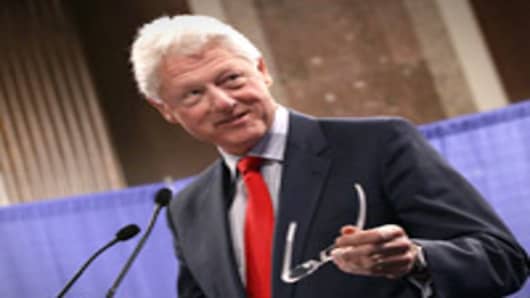President Obama can win the health care fight but may need some parliamentary maneuvering to do so, former President Clinton told CNBC.
Amid the partisan rancor that has divided the two sides in the battle, Clinton said in a live interview that Obama can split the difference by making what he called "painful" concessions.
One of those measures would entail sacrificing some of the health reform details by making the proposal part of the legislative reconciliation process. In doing so, he could skirt the Senate's 60-vote requirement for the individual plan and settle for the simple majority needed to pass a spending bill.
The reconciliation process prohibits the Senate from filibustering, which can only be broken with a supermajority vote as well.
"I think the president made a good start with his address to Congress and we ought to keep hammering home the big realities and put the people who are against this right where they belong," Clinton said. "We are killing our competitive position by spending too much money on health care. I still think that the president's going to win this battle."
Clinton said forgoing the 60-vote plan that would be required to break out health care would allow Obama to maintain the controversial public option even though other parts may have to be excluded. The public option essentially calls for a government plan that would be offered in case no affordable private health care options are available to individuals and businesses.
"We actually may get a public option," Clinton said, but added, "we may have to give up some other things which actually may be very painful in terms of health care reform."
Speaking just before the kickoff for the annual Clinton Global Initiative meeting, Clinton also said Americans are lagging behind the world in terms of addressing global warming.
Addressing climate change and reducing the US dependence on foreign oil isn't just good for the environment, it's good business, he said.
Selling the public on the financial incentives for addressing climate issues will be paramount at a time when consumers are facing intense pressures and are wary of any new proposals unless they can be persuaded the plans make economic sense, Clinton said.
"We have to prove this is good economics," he said. "We're not going to really get progress on this climate issue until we can prove there is an economic path forward that is positive for ordinary Americans and ordinary people in the rest of the world. I'm convinced we can do it, we just have to figure out how."



